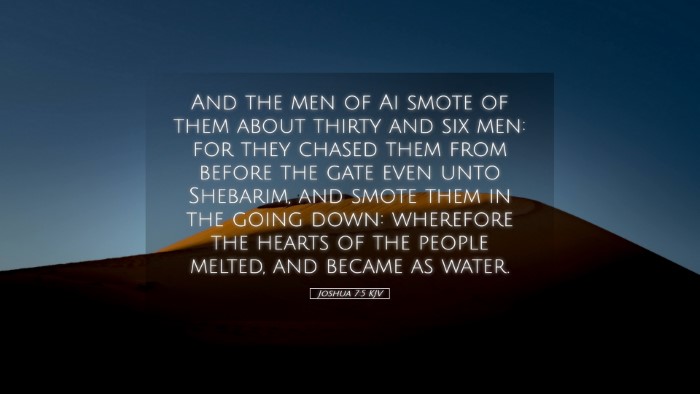Commentary on Joshua 7:5
Verse Translation: "And the men of Ai smote of them about thirty and six men: for they chased them from before the gate even unto Shebarim, and smote them in the going down: wherefore the hearts of the people melted, and became as water." (Joshua 7:5, KJV)
Introduction
This verse presents a significant moment in the history of Israel as they confront the city of Ai. The dramatic defeat of the Israelites raises crucial themes surrounding sin, leadership, and divine favor that have been deeply explored in public domain commentaries. Below we will provide insights from leading biblical commentators, synthesizing their thoughts and enriching the understanding of this passage for pastors, students, and scholars alike.
Contextual Analysis
The defeat at Ai followed the remarkable victory at Jericho, showcasing a stark contrast in the fortunes of the Israelites. Understanding this transition is vital for grasping the theological implications of the events that unfolded in Joshua 7.
Sin and Its Consequences
Albert Barnes emphasizes the role of Achan's sin as the catalyst for Israel's failure at Ai. The defeat serves as a divine lesson that unrepented sin, especially within a community, leads to catastrophic results.
- Achan's transgression: The act of taking spoils from Jericho violated the command of God, creating a breach in Israel's covenant relationship.
- Corporate responsibility: The defeat illustrates that the sins of one can impact the many, a profound reminder of collective accountability in the body of believers.
The Role of Leadership
Matthew Henry highlights the importance of leadership and proper guidance in the victories of Israel.
- Joshua's despair: The aftermath of the defeat finds Joshua torn with grief and confusion, prompting questions about the Lord's faithfulness.
- Leaders’ accountability: The commentary suggests a leader's failure to seek God before undertaking a venture can lead to dire consequences.
Theological Reflections
This verse not only narrates a historical event but also serves as a source of rich theological reflection. As Adam Clarke notes, the emotional state of the Israelites—"the hearts of the people melted"—stands as a metaphor for despair when separated from God’s favor.
- Theological implications of defeat: The defeat signifies a withdrawal of God’s presence as a response to sin, establishing a recurrent biblical theme.",
- Faith amid adversity: Despite the setback, it is essential for the Israelites to remember their previous victories which were attributed to God's grace and power.
Restoration and Hope
Despite the bleakness of this narrative, the larger story of Joshua contains hope and restoration. The Lord's guidance, albeit temporarily hidden, ultimately leads Israel back to victory as they rectify their wrongs.
- Repentance and restoration: The pursuit of God after sin is crucial. Joshua's subsequent actions of seeking the Lord's direction signify the path towards communal healing and restoration.
- Hope in divine promises: This event underlines God’s faithfulness to His people, showing that even in discipline, His purpose is to bring His people to a deeper relationship with Him.
Application for Today
The lessons derived from Joshua 7:5 can echo throughout the modern church and individual believers' lives.
- Accountability in community: Today’s believers are reminded of the importance of accountability and transparency, recognizing that personal actions can impact the whole community.
- Seeking God's will: As Joshua learns, it is imperative to seek God before embarking on tasks. Prayer and seeking divine wisdom should precede our decisions.
- Responding to defeat: Believers are encouraged to respond to failure not with despair, similar to Joshua, but with a commitment to seek God and address any sin hindering their walk with Him.
Conclusion
Joshua 7:5 is not simply a recounting of military defeat; it is a lesson on sin, leadership, and the nature of God’s covenant with His people. Insights from eminent commentators provide a multi-faceted understanding of the narrative, impacting theological interpretation and practical application for today’s church. In engaging with this text, may we recognize our dependency on God's grace and strive towards integrity, community accountability, and unwavering faith in the face of challenges.


